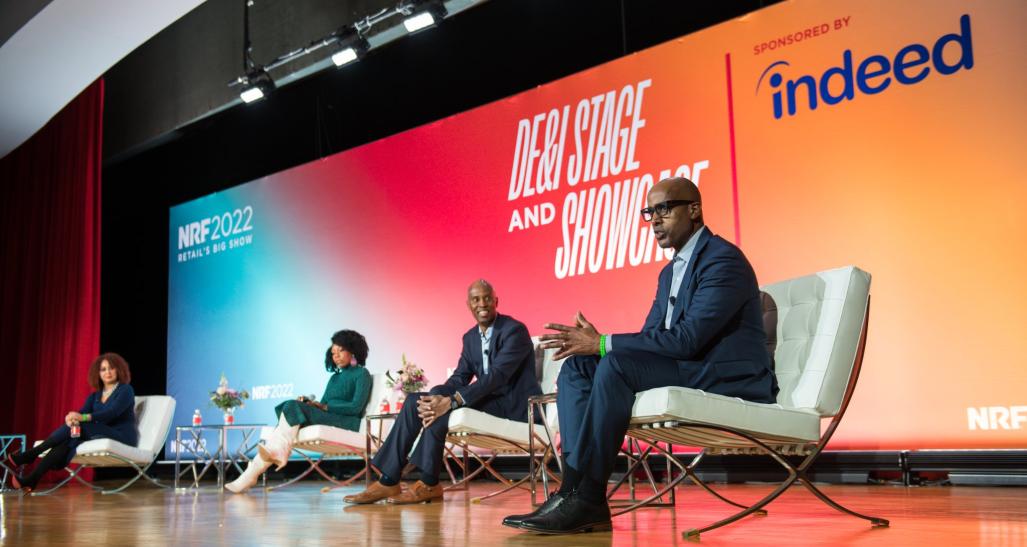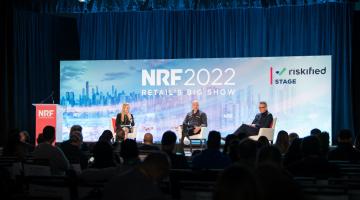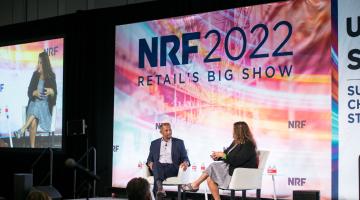
Diversity, equity and inclusion must be seen as an ongoing journey rather than a destination — and the steps taken must be individual in addition to corporate.
“The Achievable How: Implementing DE&I learnings inside your business,” presented at NRF 2022: Retail’s Big Show in partnership with Indeed, allowed leaders to share stories of training, conversations and policies making a difference.
But there was also a strong call for attendees to take a hard look in the mirror, to personally call on the “quiet voices” that might otherwise not be included, to be an ally or sponsor, to be willing to openly discuss personal experiences with those who are different — and even to present their best selves by turning on their cameras during virtual meetings.
Couldn't make the show? Take a look at our event recap to catch up on content from NRF 2022.
Mark Irvin, chief inclusion, diversity and talent officer for Best Buy Co. Inc., said that 2020 and 2021 were the years of making commitments. But 2022 “has to be the year of action,” he said. “It has to be a year where all of us begin to stop saying, ‘If you would do …’ but now start to say, ‘I will do.’”
The session, which took part as part of the DE&I Stage and Showcase program, was moderated by Colleen Taylor, president, merchant services – U.S., American Express. In addition to Irvin, panelists included Jonathan Mayes, senior vice president, chief diversity and inclusion officer, Albertsons Companies; Christiane Pendarvis, co-president and chief merchandising and design officer, Savage X Fenty; and Kimberly J. Smith, founder and CEO, Marjani Beauty.
As for those cameras, Taylor shared research that employees of color are more likely to turn them off than others. Pendarvis wondered whether it was related to cultural traditions of clearly delineating between the work persona and the whole self.
“They may not be one and the same,” Pendarvis said. “I know from my own personal experience, and from conversations with people, there’s this idea that you don’t show yourself at work. You come in, you do your work, you keep your head down, you’re not vulnerable because there’s a fear of how you may be perceived, judged or evaluated.”
One positive side of remote work during the pandemic is that there’s been less opportunity for microaggressions, she said. Irvin offered another upside: In virtual meetings, because people can raise their hands and be recognized, there’s more chances for everyone — including BIPOC employees and those who are simply introverted — to speak.
“What’s interesting is that many of our BIPOC employees have said, ‘I don’t want to go back. Because I don’t want to fight through that. I love the ability to put my hand up, and someone acknowledges me and hears me,’” Irvin said.
In terms of corporate DE&I efforts, the panelists talked about the need for clear metrics and ongoing opportunities for learning. Teachings, discussions and surveys about inclusion, unconscious bias, equity and belonging can’t be one-and-done. Smith also noted the importance of not just diversity in people, but also diversity in thought.
Watch DE&I sessions from NRF 2022: Retail’s Big Show on demand.
Mayes shared the promising story of a white employee who finally found understanding during a two-hour company discussion. The man realized, he said, that some “invisible doors” had been opened for him that weren’t open to everyone else. “We are not high-fiving each other and calling it done,” Mayes said. “But we are on a mission to get to where we want to be.”
The panelists also touched on efforts to ensure representation at all levels, to choose corporate partners that truly help fill in gaps and create understanding, and to keep talking about the issues.
Pendarvis, recounting a recent conversation about race relations with non-BIPOC friends, said they asked her husband whether he’d ever been stopped by police for “driving while Black.” She and her husband laughed; of course he had, she said.
“I looked back on that moment, and said, that’s my fault that they didn’t know that,” she said. “It’s my fault for not sharing more about, what does it mean to live in this body, in this country.”
Pendarvis took that concept to work, aiming to create an environment where people are more curious about the lived experiences of others — and more open in sharing their own.


